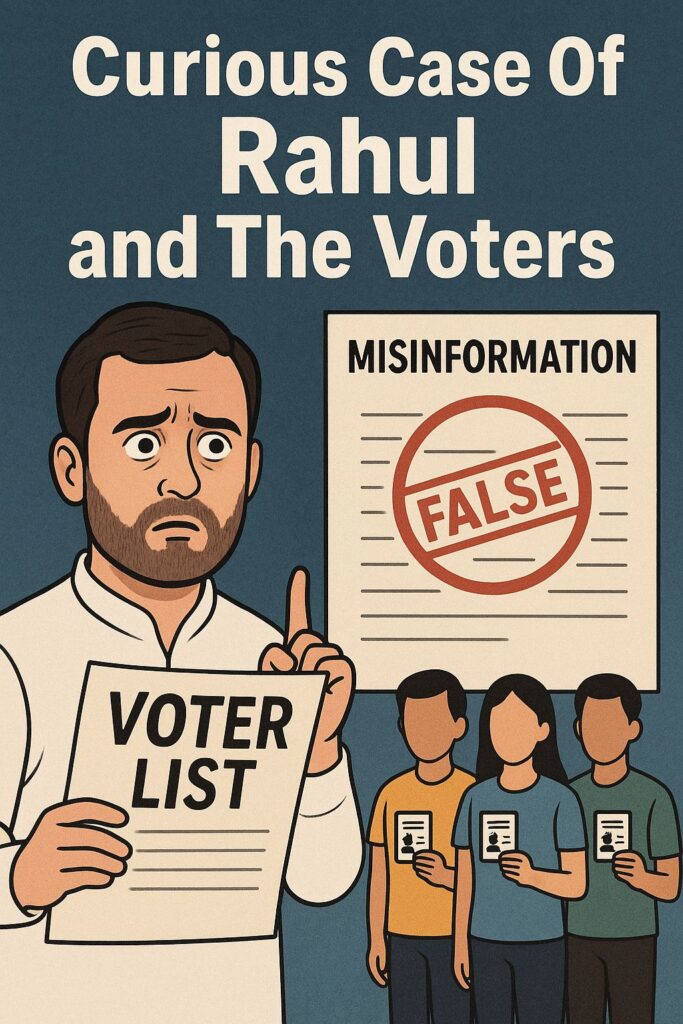Rahul Gandhi claims the center controls voter lists. Do his Vote fraud allegations ignore basic constitutional facts ?. Is it stunning ignorance or deliberate deception that threatens India’s democratic foundations ?

Deconstructing the opposition’s misleading narrative on voter list management
Rahul Gandhi is either deploying deception or doesn’t understand the Constitution he swore to uphold. His explosive allegations of centralized voter fraud aren’t just wrong, they’re constitutionally impossible. When the Congress scion claims the central government manipulates electoral rolls nationwide, he ignores an inconvenient truth: state governments control their own voter lists. This isn’t a matter of political interpretation, it’s constitutional law. Gandhi’s fraud narrative doesn’t just collapse under scrutiny; it exposes a dangerous willingness to destroy public faith in democracy for partisan gain.
The opposition’s narrative rests on a critical falsehood that the central government directly controls and manipulates voter registration. This claim ignores a constitutional reality that should embarrass any serious political leader, state governments administer and manage their own electoral rolls process.
Under Article 324 of the Constitution and the Representation of the People Act 1950, India operates a sophisticated federal system where the Election Commission of India provides oversight and guidelines, but ground-level implementation remains entirely within state jurisdiction. When Gandhi accuses the centre of “vote chori” he conveniently omits that the very officials he claims are being manipulated. Booth Level Officers, Electoral Registration Officers, and District Election Officers are state government employees.
Consider the irony: when Congress-governed states finalize their voter lists, are we to believe that Congress officials are complicit in their own electoral fraud? The logical inconsistency is staggering, yet it forms the backbone of the opposition’s argument.
The Ground Reality of Electoral Administration
The voter registration process operates through multiple accountability layers that opposition claims systematically ignore:
Frontline Verification: Booth Level Officers, drawn from education, revenue, and municipal departments, conduct door-to-door verification. These aren’t central government agents, they’re local state employees with deep community knowledge.
Adjudication Layer: Electoral Registration Officers, typically Sub-Divisional Magistrates and Tehsildars, handle contested cases. Again, state officials operating under statutory guidelines, not central directives.
Oversight Structure: District Election Officers and Chief Electoral Officers coordinate at district and state levels, ensuring adherence to Election Commission guidelines while maintaining state administrative control.
This multi-tiered system includes built-in transparency mechanisms: public display of draft rolls, political party participation through Booth Level Agents, and enhanced verification protocols when changes exceed threshold limits. If fraud were systematic, it would require coordination across multiple state departments, local authorities, and political party observers, a conspiracy theory that defies practical logic.
Deconstructing the “Multiple Voters” Red Herring
Gandhi’s emphasis on multiple unrelated voters at single addresses reveals either naivety about urban demographics or deliberate misrepresentation. The reality is more mundane:
Legitimate Multiple Registrations: Urban apartment complexes, student hostels, and group housing naturally generate multiple valid registrations at single addresses. This isn’t fraud, it’s modern living patterns.
Administrative Challenges: Verification systems already address anomalies through Special Summary Revision and Special Intensive Revision processes, with political party participation and public scrutiny.
State-Level Solutions: The same state officials Gandhi indirectly accuses manage these verification processes, regardless of which party governs the state.
The opposition’s failure to distinguish between administrative challenges and systematic fraud undermines their credibility while revealing a troubling willingness to weaponize legitimate process complexities.
The Dangerous Game of Institutional Delegitimization
Gandhi’s claims transcend mere political opposition,they constitute a direct assault on democratic confidence. By alleging centralized control where none exists, the opposition creates public confusion about electoral integrity while ignoring the robust legal framework protecting voter registration.
The Election Commission has repeatedly demanded evidence for fraud allegations, requiring affidavits rather than accepting inflammatory rhetoric. This institutional response highlights the opposition’s failure to provide substantive proof beyond anecdotal cases that existing verification systems are designed to address.
The Constitutional Framework Works: The Representation of the People Act 1950 and Registration of Electors Rules 1960 create transparent, accountable processes with judicial oversight. These aren’t tools for manipulation,they’re barriers against it.
Federal Balance Prevents Centralization: The constitutional design ensures no single authority can unilaterally control voter registration across India’s diverse states. Gandhi’s allegations require ignoring this fundamental federal principle.
The Price of Political Deception
When opposition leaders misrepresent electoral processes, they don’t merely engage in political theatre, they undermine the very institutions that guarantee democratic legitimacy. The consequences extend beyond partisan advantage:
Public Confidence Erosion: False fraud allegations create voter scepticism about legitimate electoral outcomes, potentially reducing participation and democratic engagement.
Institutional Damage: Unfounded attacks on the Election Commission’s integrity weaken public trust in constitutional authorities designed to ensure electoral fairness.
Democratic Backsliding: When major political parties abandon factual discourse for conspiracy theories, democratic norms suffer permanent damage.
Defending Democracy from Democratic Politicians
India’s electoral integrity rests on a carefully constructed federal system where state governments manage voter registration under constitutional oversight. This decentralized approach prevents the centralized manipulation that opposition claims allege while ensuring local accountability and transparency.
Rahul Gandhi’s voter fraud narrative collapses under constitutional scrutiny, revealing either stunning ignorance of electoral law or cynical manipulation of public sentiment. When political leaders choose conspiracy theories over constitutional facts, they become democracy’s greatest threat.
The real danger to Indian democracy isn’t electoral fraud,it’s politicians who prioritize power over truth, rhetoric over reality, and partisan advantage over institutional integrity. Citizens deserve leaders who understand their own constitution, respect electoral institutions, and engage in honest political discourse.
In defending electoral integrity, we must defend it from those who would destroy public confidence through deliberate deception. Democracy’s greatest enemy isn’t external interference, it’s internal betrayal by those sworn to protect it.
Read . Trust. Share


